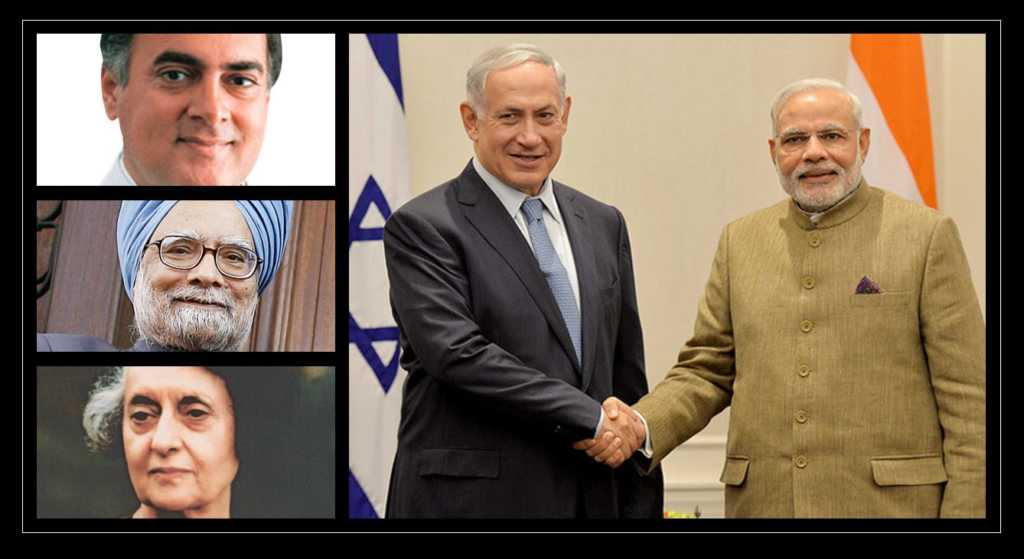Relations between Jerusalem and New Delhi have not always been warm, though Israel has been a good friend of India, but New Delhi has always continued to shy from demonstrating its friendship. Now this is about to get changed with Modi at the helm of the affairs and therefore there will been a tectonic shift in the strategy which has been long overdue. This will be the first time since independence of the country that an Indian PM will be visiting Israel in nearly 7 decades.
Although both countries gained their independence from the British around the same year, they found themselves heading in different directions for decades, India as a leader in the Non-Aligned Movement (NAM) that maintained close relations to the Arab world and the Soviet Union while Israel which linked its future to close ties with the United States and Western Europe.
India’s large Muslim population was another major obstacle to building a relationship with Israel, as India under the Congress regime always feared that close relations with the Jewish State might somehow alienate its Muslim citizens and hurt its relations with the Arab world. Though over the years, the Indian government has toned down its reactions to Israel’s treatment of Palestinians. India has also begun denouncing Palestinian suicide bombings and other terrorist acts in Israel, something that was seen earlier as rather justified in light of the Israeli policies against the Palestinians. India is no longer initiating anti-Israel resolutions at the United Nations and other international forums.
This re-evaluation is based on a realization that India’s largely pro-Arab stance in the Middle East has not been adequately reciprocated and rewarded by the Arab world.
India has received no worthwhile backing from Arab countries in the resolution of problems it faces in its neighborhood, especially Kashmir. There have been no serious attempts by the Arab world to put pressure on Pakistan to reign in the cross-border insurgency in Kashmir. On the contrary, Arab nations have firmly stood by Pakistan, using the Organization of Islamic Cooperation (OIC) to build support for Islamabad and jihadi groups in Kashmir.
Both India and Israel see themselves as isolated democracies threatened by neighbors that train, finance and encourage terrorism and therefore both countries also view their cooperative relationship as of a strategic importance.
Another count for a true friendship help by Israel towards India has been during the Kargil war. Kargil being a low intensity war, required tremendous restraint on the part of Indian forces because the military operations had to be restricted to the Indian side of the LOC. Surveillance and precision bombing material, laser guided missiles and the Unmanned aerial vehicle (UAV) provided by Israel in spite of international pressure enabled the Indian armed forces to push back the Pakistani army behind the LOC.
Going back to the history India and Israel did not have a relationship during the non-BJP or Congress-led Nehru-Gandhi regimes. Despite this fact and even with the absence of formal diplomatic ties, India under Congress rule had obtained military assistance during the wars in 1962 (with China), and 1965 & 1971 (with Pakistan). Israel was one of the first countries to recognize Bangladesh in 1971. It was only during the PV Narasimha Rao regime in 1992 that New Delhi established full diplomatic relations with Tel Aviv, but once again under the two UPA regimes led by Manmohan Singh, the strategic relations between the two countries remained as close as before. So much so that the Congress–led government in 2010 did not allow a party MP to ask questions about the India-Israel defense relationship in Parliament on the grounds that it pertained to a “state secret”. Although, in the wake of the 26 November, 2009 attacks on Mumbai, India’s defense purchases from Israel increased so much that the latter replaced Russia briefly as New Delhi’s largest defense supplier in 2009.
Israel has sold India motion detectors and other monitoring equipment to track infiltration across the Line of Control (LoC) between India and Pakistan in the Jammu and Kashmir region, they also sold unmanned aerial vehicles (UAVs) to India for high-altitude surveillance and has offered to provide anti-insurgency training for Indian forces in the area as well. India has also taken advantage of Israel’s global reputation for upgrading outdated weapon systems and Soviet-era military hardware. Israeli missiles, rockets, radar and communication equipment’s, ships, assault and sniper rifles, night-vision devices, and border monitoring equipment have all been added to the Indian arsenal.
So much so for a friend and it still remains an enigma why the Congress government always remained elusive towards the Israel as a matter of India’s foreign policy.
